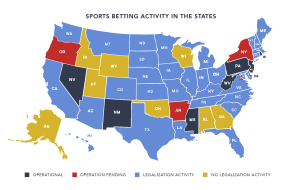When the U.S. Supreme Court ruled last year that states could decide whether to legalize sports gambling, there was jubilation. States were envisioning billions and billions of dollars in profits flowing into their coffers. Lawmakers were salivating at the prospects of getting additional revenue. Now, one year after the High Court’s decision, sports gambling has had mixed results — at best.

How Many States Have Legalized Sports Gambling?

There are currently nine states that have some form of legalized sports gambling. They have either legalized it, but not implemented it, or now offer sports gambling. Nevada has had single sports gambling for decades. New Jersey, Delaware, Mississippi, Pennsylvania, Rhode Island, and West Virginia all have legalized sports gambling. Arkansas residents voted to legalize sports betting, but the state has not implemented it yet.
Other states have also voted to legalize sports wagering but have not yet implemented it. These include Indiana, Iowa, Montana, New York, Oregon, and Tennessee. All have laws on the books but have yet to make a move toward sports gambling.
The Not so Good Side of Sports Gambling
In the states that have legalized sports gambling, the revenue that’s coming in has disappointed many legislators and gambling experts. First, politicians used projections to figure out how much revenue sports gambling would generate. In some cases, the projections overrepresented the revenue. In reality, experts say most sportsbooks generate profits between 5 and 6 percent of the amount wagered by gamblers. If the state’s projections for sports gambling revenue is higher than its profit, some residents might be disappointed.
Second, there has been a lag in revenue from online sportsbooks. Currently, only New Jersey and Nevada are taking online sports bets. However, Pennsylvania will unveil its online gambling and sportsbook venture later this month. Other states may want to think about getting on board online. Experts estimate that sportsbooks in New Jersey are taking in three times the money online as they are in person.
There Are Some Positives, However
While the projections in some states are not very rosy, other states have seen their sportsbook revenue grow. Pennsylvania has already earned its first-year projected sportsbook revenue. Lawmakers had estimated the state would bring in $5 million by the end of June. However, the state surpassed that total in April.
Delaware has also done well. Its lawmakers projected the first-year profit from sportsbooks would be around $5 million. Delaware exceeded that goal. Through the first 10 months of the fiscal year, sportsbooks had earned more than $6 million in profit. Mississippi has also exceeded its goals. Mississippi’s lawmakers projected that the state would earn between $5 million and $10 million in profit. The state has already earned more than $3 million in profit, with four months reporting to go.
Possible Solutions
It is easy to see where lawmakers overestimated their sportsbook projections. Rhode Island has seen less than $1 million in profit. Lawmakers projected the state would see $23 million in profit in the first year. West Virginia also overshot its mark. Its projection for the first year of sportsbook profit was $5 million. The state has only earned $900,000 in six months.
The picture is cloudy with regard to sportsbooks in some states. Many people in the United States are not aware that sports gambling is legal. Even in the states where sportsbooks are legal, residents are not aware of the change. Also, people are still not sure how to place bets legally via sportsbooks. The gambling industry needs to do a better job at self-promotion, according to the experts.
Disclaimer: All images are copyright to their respective owners and are used by USA Online Casino for informational purposes only.












